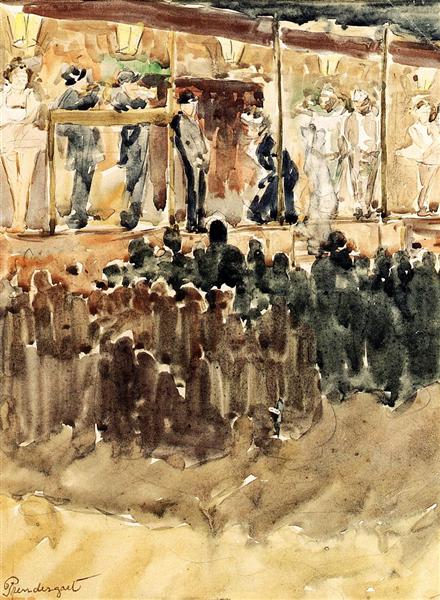Description
The painting "Parallel spectacle" (1894) by Maurice Prendergast is a work that encapsulates the essence of American art at the end of the 19th century. Prendergast, recognized as an outstanding representative of the post -impressionist movement and the American impressionism, achieves in this work a masterful fusion of color, shape and narrative content. He painting It reflects the fascination of the era for popular fairs and shows, a recurring theme in the setting work that invites the spectator to immerse himself in a vibrant and full of life environment.
The "parallel show" composition is dynamic and fluid. In it, there is an agglomeration of characters that seem immersed in various activities within what is suggested to be an outdoor show. Arndast uses the disposition of the figures to generate a sense of movement towards the center of the scene, which points to the celebration of the moment and the social interaction that characterizes the festive environment. Although the faces of the characters are, for the most part, anonymous and are not detailed thoroughly, their positions and attitudes transmit a palpable energy, suggesting joy and astonishment.
The use of color in "parallel show" is one of the most charming and distinctive aspects of the work. Arndast uses a bright and saturated palette that covers warm and cold tones, creating a visual contrast that captures the viewer's attention immediately. The tones of blue, yellow, and green are intertwined harmoniously, suggesting a luminous and festive atmosphere. This chromatic choice is aligned with the principles of impressionism, and in particular with the influence that Arrentgast received from artists such as Claude Monet and Pierre-Auguste Renoir, whom he admired deeply. Through a technique that fuses rapid and soft brush touches, the artist manages to not only represent the light and atmosphere of the place, but also evoke a sense of ephemeral beauty.
The distinctive elements of the show, such as tents and other accessories typical of the fairs, are skillfully incorporated into the composition, adding depth and context to the work. Without the details become an overwhelming element, the artist manages to maintain a balance that allows the viewer to appreciate both the whole and the nuances of the scene. The choice to represent a popular entertainment scene is not accidental and can be interpreted as a reflection on modernity and the new forms of communication and socialization that began to emerge in the American society of the time.
"Parallel spectacle" is a testimony of the particular style of Prendrgang, who, in his search to capture the joy of everyday life, transcends the simple representation to offer a visual experience that resonates with the spirit of his time. His works, impregnated with an atmosphere of celebration, mark a milestone in the evolution of American art, by adopting European influences while firmly anchoring in local culture.
In the end, "Parallel spectacle" is presented not only as a work of art, but as a melting pot of collective emotions and experiences. It is a reminder of the power of art to capture the ephemeral essence of a moment and the ability of the shows of everyday life to unite people in a fabric of communion and celebration. Prendastast's work continues to be a source of inspiration and admiration, testifying the indisputable talent of an artist who managed to combine the vivacity of color with an evocative expression of the human soul.
KUADROS ©, a famous paint on your wall.
Hand-made oil painting reproductions, with the quality of professional artists and the distinctive seal of KUADROS ©.
Art reproduction service with satisfaction guarantee. If you are not completely satisfied with the replica of your painting, we refund your money 100%.

